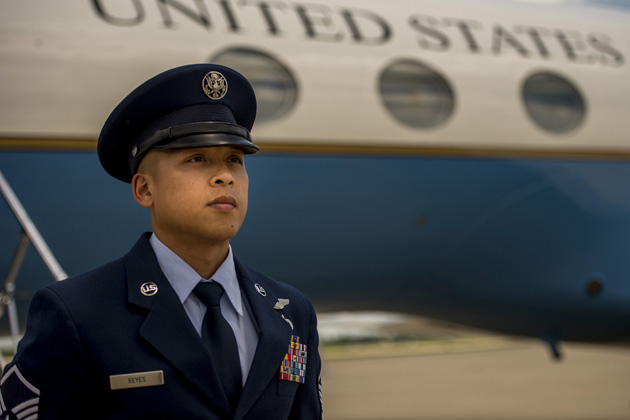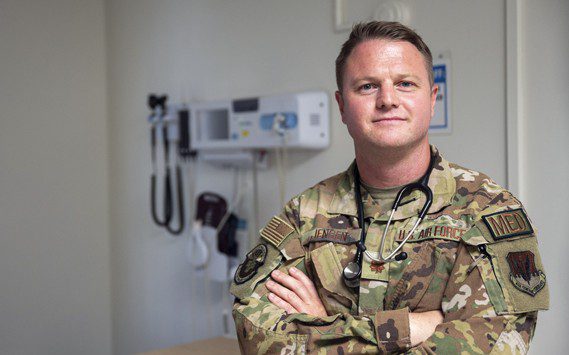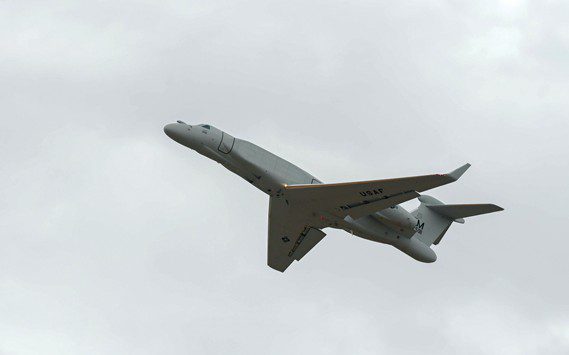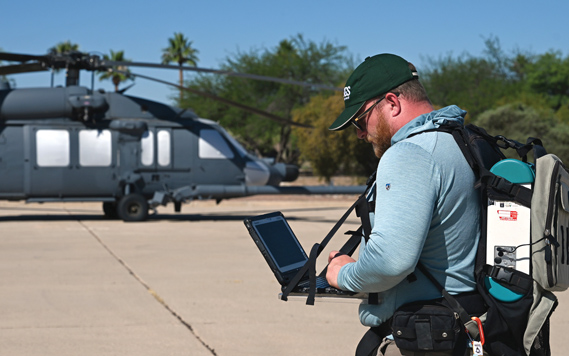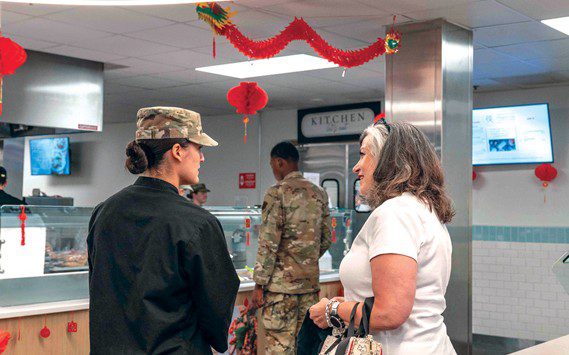JOINT BASE ANDREWS, Md. (AFNS) — Growing up, Master Sgt. Kristofer Reyes and his cousins would use rubber and rocks from a nearby recycling center and create games. He was born to a poor family in Luzon, Phillipines. His parents divorced when he was 2 years old and his mom moved to the U.S. That left him and his siblings stuck in poverty, with only access to one meal a day coming from their village’s Christian school. Reyes got his first toothbrush when he was 9; yet he hasn’t required much dental work.
With a lively smile, Reyes, a 99th Airlift Squadron flight engineer, explained, “Being on an island had its advantages. I always had access to salt water and would gargle that to keep my teeth clean. Besides, clean teeth and fresh breath were the least of my worries; the real danger came from going to school.”
Similar to some parts of the Philippines today, there was fighting between Muslims and Christians in southern Philippines in the early 1980s. To complicate matters, Reyes’ Christian village school was erected on land the local Muslims considered holy. Armed men would frequently attack Reyes’ school with small-arms fire and other tactics.
“It was common to hear gunshots ring in the middle of a lesson or when we were at recess,” Reyes said. “I don’t think they actually wanted to hurt or kill us, rather they just wanted the school relocated off their land.”
Still, growing up hungry and without essentials, much less toys, in an environment where violence was ever present wasn’t the life Reyes’ mother wanted for him. In 1992, his mom petitioned for Reyes to move in with her in San Francisco.
Leaving the Philippines would be bittersweet for Reyes. Tagalog was the only language he’d ever spoken, though he learned some English in school. Despite the violence and poverty, there was an uncanny beauty to the Pacific Islands, one that Reyes would never forget.
Coming to America was no easy affair for Reyes or his family. While it paled in comparison to the poverty or violence in his homeland, the mean streets of urban San Francisco didn’t prove overly easy to walk either. The Bay Area was home to many dangerous gangs, and a prevalent crime and drug culture. After surviving the religious conflicts in his homeland, Reyes wasn’t about to let any seedy elements of California get the best of him.
“I just set my mind to doing my best to stay away from trouble and focus on school and work,” he said. “I was the first in my family to graduate high school, and later the first in my family to graduate college.”
While overcoming a language barrier that made English, science and social studies challenging, Reyes quickly excelled at the universal language of mathematics. In college, he would go on to major in engineering. However, engineering proved difficult for him and since he wasn’t doing well academically, he said he dropped out of the program and enlisted in the Air Force.
Reyes didn’t have a guaranteed career path coming into the Air Force. He enlisted as open mechanical, which meant he was guaranteed a mechanical job but the exact job would be selected in basic military training at the needs of the Air Force.
“I remember thinking, ‘Please don’t make me an engineer or anything in the engineering career field,’” said Reyes, who, after a few weeks in BMT, learned he was going to become an F-16 Fighting Falcon engine mechanic.
After technical training, Reyes shipped off to Luke Air Force Base, Arizona, and pushed himself hard to learn everything about the Pratt and Whitney F100 turbo fan engine. His eagerness to learn and dedication to the mission quickly caught the attention of his supervisors, and he was fast-tracked to all available training opportunities; he mastered maintaining that engine and even earned the maintenance professional of the year award.
“Kris was hands down the best jet mechanic I had work for me during my time in the Air Force,” said retired Master Sgt. Alex Daicos, Reyes’ supervisor at Luke AFB. “He is truly a whole concept Airman. Not only does he give 100 percent in his duties but to his family as well.”
Daicos said work always felt more like family with Reyes around.
“As any good leader knows, you’re only as strong as the shoulders who carry you,” Daicos said. “Even with all the heat and grueling hours we worked to keep the aging F-16 fleet in the air, Kris always managed to have everyone laughing and just made things better. I was sad to see him cross-train, but at the same time I kept telling him it’s a big Air Force and he can go and do what he wants. Kris takes feedback and mentorship, and runs with it; there’s no challenge too hard with an always positive attitude and pure determination to achieve greatness.”
Though Reyes loved maintaining the F-16, he always felt he was meant to fly. “Seeing pilots and enlisted aircrew walk around in their flightsuits only solidified what I already knew,” he said. “I needed to be part of the operational Air Force; I needed to fly.”
Reyes submitted an application to retrain into the Air Force flight engineer career field.
“It’s very ironic that the guy who dropped out of the engineering program in college would strive to be a flight engineer, but the FE career field is renowned as one of the smallest and most difficult enlisted flying tracks,” Reyes said.
“That’s also ironic, but whenever I’m told something is the most difficult or unattainable, it’s what I want to do. I regret failing at engineering school in college, but I’ve used that failure to boost my determination to succeed.
Sometimes the best life lessons are learned by failing and bouncing forward to be better,” he continued.
Despite the irony, Reyes was accepted into the prestigious flight engineer career field and graduated technical training as a distinguished graduate. In fact, Reyes has earned distinguished graduate three times in his career; during jet engine mechanic tech school, flight engineer tech school and Airman leadership school. He also earned the commandant’s leadership award at his NCO academy.
After completion of the basic flight engineer training course and appropriate flying training course, Reyes relocated to the 36th Airlift Squadron at Yokota Air Base, Japan, where he entered qualification training to be a C-130 Hercules flight engineer.
Burning through upgrade and qualification training, Reyes quickly made a name for himself as a go-to flight engineer for systems troubleshooting. Whenever there were electrical or mechanical problems on the C-130, his expertise was called upon. He flew hundreds of missions to locations all around the Pacific, and as he worked his way up the ranks, he began instructing and evaluating other flight engineer.
“When I first met Kris, I was stunned by his positive attitude,” said Senior Master Sgt. Dustin Grove, the 618th Air Operations Center Current Operations Directorate superintendent. “His motivation to mentor those around him and his dedication to the unit’s mission are second to none. Kris is an example of what others should strive to become and his selfless actions and behaviors prove that he is a leader among leaders.”
March 2011 brought new challenges when a 9.0-magnitude earthquake hit Japan, decimating much of the main island of Honshu and killing more than 15,000 people.
Japan, and indeed the world, wasn’t prepared to respond to the aftermath of the Tōhoku earthquake and tsunami, but joint efforts by the Japanese, U.S. and other nations resulted in quick-reaction and humanitarian missions. The most notable of such by the U.S. Air Force was Operation Tomodachi. It involved roughly 24,000 U.S. service members and the C-130s based at Yokota AB played a herculean effort in the operation; they flew seemingly non-stop missions. All those sorties took their toll on the aircraft and it was flight engineers like Reyes and other maintainers who kept the aircraft in the air, flying the vital humanitarian missions to support Japan.
With Operation Tomodachi in the rearview mirror, it wasn’t long before his career field realized the level of talent they had on their hands, and quickly moved Reyes to the flight engineer tech school, so he could train all newly assigned and upgrading flight engineers.
“Being an instructor is a unique and rewarding experience,” Reyes said. “It’s the only place where you can impact the technical skills and mindset of every C-130 FE.”
With an already illustrious career despite such modest beginnings, the Air Force isn’t yet done with Reyes.
At a small joint base on the outskirts of the nation’s capital is a unique wing responsible for executive airlift of the president, vice president, cabinet members, combatant commanders, and other senior military and elected leaders. Like so many times before, the needs of the Air Force came knocking on Reyes’ door and he raised his hand in earnest to answer.
The 89th Airlift Wing flew Reyes out to Joint Base Andrews, Maryland, in August 2014 for a four-day hiring board. They showed him their pristine blue-and-white aircraft and introduced him to the Special Air Mission Foreign (SAM Fox), mission. Day and night for four days straight, Reyes was immersed in the 89th AW culture, and all the while, panels of SAM Fox leaders grilled him to ascertain his level of commitment, professionalism, attitude, knowledge and capability to perform the full-spectrum of his duties alone, while being the face of the Air Force to America’s most senior leaders.
After proving he was indeed SAM Fox material, Reyes was reassigned to the 99th Airlift Squadron.
The 99th AS is one of three squadrons under the 89th Operations Group. Combined with the 1st Airlift Squadron and Presidential Airlift Group, the crews of the units operate some of the most advanced commercial-based aircraft in the world, including the VC-25, known mostly for its call sign of “Air Force One,” given whenever the president is on board.
Reyes was sent to training to learn all the mechanical and engineering systems of the C-37A, which is a highly modified Gulfstream G5, and is a flying office enabling diplomacy and global influence for the U.S.
“Master Sgt. Reyes has come to the 99th AS with a tremendous background complete with hardships and perseverance … but also success and determination,” said Lt. Col. Jason Kirkland, the 99th AS commander. “These experiences have shaped his character and molded him into the Airman he is today. He is a better leader, mentor and wingman because of it.”
Though any given day or night Reyes is tasked with flying senior leaders around the globe, he was also recently selected for something unique. Reyes is the only flight engineer to have been selected for the Air Force Language Enabled Airman Program, where his Tagalog language skills are being used to further international interoperability between U.S. and Philippine militaries.
From a poor, yet wide-eyed boy living in a war zone, to the dedicated professional Airman, husband and father he is today, Reyes has truly defied the odds and continues to inspire whomever he comes in contact with.
“We all come from somewhere, but we’re not all relegated to the life we were born into,” Reyes said. “If we have a dream that means we have hope, and if we have hope, we already have the fuel to fly forward. Sometimes the only missing component for success is a wingman, a person to stand side by side with and begin the journey. But, ultimately, we each have the power within ourselves to succeed, and to let our successes motivate others.”






